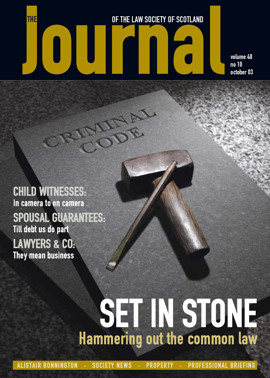A comment on the Draft Criminal Code
The Draft Criminal Code both fits with the new constitutional architecture of Scotland and contains a number of modern and attractive features. Its introduction into the public domain is to be welcomed, all the more so because of its measured, non-partisan and non party-political origin.
Through the Scotland Act we now have a law-making body which can dedicate itself to the careful consideration of such a proposal and can ensure full public consultation and participation. For example, such policy issues as the age of criminal responsibility (is 12 too low?) can be determined.
The Human Rights Act has hitherto exercised an influence in criminal justice more in terms of what might be seen as procedural matters, for example judicial appointments, sentencing powers, and so on. The Draft Code addresses the substantive implications in terms of the need of accessibility, foreseeability and certainty – features not consistently met by our reliance upon common law. For example, the long overdue cutting down to size of the elastic “breach of the peace” by the introduction of “violent and alarming behaviour” and “intrusive and alarming behaviour” is to be greatly appreciated.
The explicit reference to international obligations, such as the UN Convention on the Rights of the Child and the prohibition of child physical punishment, is notable. This is illustrated by the introduction of new offences such as torture and inhuman and degrading treatment.
Perhaps as much as anything it is the use of ordinary English which is to be commended.
Does it interfere with judicial discretion? Undoubtedly. Is that necessarily a bad thing? While it can be in certain other circumstances, such as sentencing, it is not in terms of providing modern definitions of criminal offences.
In any event too much can be expected of our judiciary, as has been demonstrated by its innate conservatism in coming to terms with what has been asked of it by the Human Rights Act.
Professor Alan Miller
Alan is Director of McGrigor Donald Rights, a member of the Centre for the Study of Human Rights Law at the Glasgow Graduate School of Law and is a Past President of the Glasgow Bar Association.
In this issue
- Why politicians have got it wrong
- The big idea
- A comment on the Draft Criminal Code
- Stories from the other side of the desk
- Employment practice liability
- Jurisdiction in insolvency proceedings
- Heard but not seen
- Inter-spouse guarantees: an update
- High value – high exposure?
- Internet arbitration clauses: shock and awe?
- Conflict of interest in commercial security transa
- Indecency no longer “shameless”
- Scottish Solicitors’ Discipline Tribunal
- Reforms to corporate insolvency law will give indi
- Rights on forestry access and limited partnerships
- Website reviews
- Book reviews
- Substitute certificates of title
- Housing Improvement Task Force
- Contaminated land: what to ask






